Clinton Orders Military Attack on Iraq
![]()
Clinton Orders Military Attack on Iraq
![]()
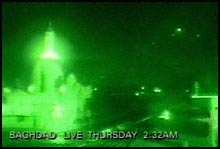
WASHINGTON (AP) -- President Clinton ordered a ``strong, sustained series
of airstrikes'' against Iraq on Wednesday in response to Saddam Hussein's
continued defiance of U.N. weapons inspectors. U.S. and British forces
unleashed a punishing volley of missiles.
The attack, which began without warning, was designed to destroy Iraqi ``military and security'' targets, Clinton said in a nationally televised address from the Oval Office.
In Baghdad, witnesses said two missiles hit the capital after midnight Iraqi time, one near one of President Saddam Hussein's biggest palaces.
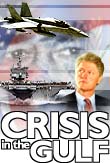
``Operation Desert Fox,'' as the Pentagon dubbed the assault, was intended
to last up to four days and involved American and British aircraft and
U.S. warships. The Pentagon announced that extra aircraft and ground troops
were being sent to the area.
Clinton said he acted ``to protect the national interest of the United States'' and Iraq's neighbors in the Middle East. He gave the go-ahead after consulting with his top advisers and reviewing a U.N. report that said Saddam had again failed to fulfill its obligations to cooperate with U.N. weapons inspectors.
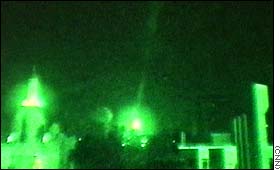
``Saddam Hussein must not be allowed to threaten his neighbors with
nuclear weapons, poison gas or biological weapons,'' Clinton said. He cautioned
that unintended Iraqi casualties were a certainty.
Secretary of State Madeleine Albright said the attacks were not designed to ``get Saddam Hussein.'' But she said the United States would step up its contacts with opposition groups and ``work with them in a sustained way.''
In the charged political atmosphere of the day, Senate Majority Leader Trent Lott, R-Miss., criticized the military action even before Clinton announced it.
``While I have been assured by administration officials that there is no connection with the impeachment process in the House of Representatives, I cannot support this military action in the Persian Gulf at this time,'' his statement said.
``Both the timing and the policy are subject to question,'' he said in a statement.
Asked about Lott's criticism, Defense Secretary William Cohen, himself a former Republican senator, said: ``I am prepared to place 30 years of public service on the line to say the only factor that was important in this decision was what was in the American people's best interests.''
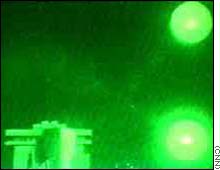
Just a month ago, Clinton ordered an attack on Iraq but called it off
at the last minute when Saddam promised to cooperate with the U.N. Special
Commission that is in charge of Iraqi disarmament. Since then, the Iraqi
president has kept up and even intensified its obstruction of the inspectors'
work, Clinton said.
``Instead of the inspectors disarming Saddam, Saddam is disarming the inspectors,'' Clinton said.
The House had been scheduled to begin debate on four articles of impeachment against Clinton on Thursday, with votes likely on Friday, but shortly after the attack began House leaders decided to delay the impeachment debate.
The top two Democrats in Congress voiced their support for the attack. ``Saddam Hussein should make no mistake that despite domestic political differences in the United States, the American people and Congress stand firmly behind the defense of our nation's vital interests,'' Senate Minority Leader Tom Daschle and House Minority Leader Dick Gephardt said in a statement.
Clinton also alluded to the impeachment debate.
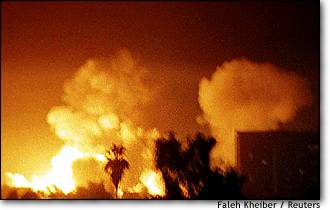
``Saddam Hussein and the other enemies of peace may have thought that
the serious debate currently before the House of Representatives would
distract Americans, weaken our resolve to face them down,'' he said. ``But
once more, the United States has proven that although we are never eager
to use force, when we must act in America's vital interests we will do
so.''
At the Pentagon, Cohen told reporters, ``The world knows that it cannot trust Saddam Hussein. The world also knows that it can trust the United States.'' The defense chief added: ``We did not use force lightly ... but Iraq has exhausted all patience.''
Iraq's ambassador to the United Nations, Nizar Hamdoon, expressed frustration. ``It looks like the United States is determined to go for a military strike regardless of what the Security Council membership feel about it, and that's very bad,'' he said.
Army Gen. Hugh Shelton, chairman of the Joint Chiefs of Staff, said the Pentagon was sending an additional 36 combat aircraft to the Gulf, including fighters, bombers and F-117 stealth planes. He said more ground troops also would go.
In the Gulf region already are 24,100 U.S. military men and women; 22 ships, eight armed with Tomahawk cruise missiles; and 201 military aircraft, among them 15 Air Force B-52 bombers also equipped with cruise missiles. The bombers are based on the Indian Ocean island of Diego Garcia.
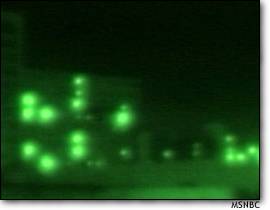
One aircraft carrier battle group is in the Gulf; another is on its
way.
British Prime Minister Tony Blair, addressing his nation Wednesday night, said there was ``no realistic alternative to military force ... We act because we must.''
Clinton, noting that the holy month of Ramadan starts this weekend, said the airstrikes were necessary now because ``for us to initiate military action during Ramadan would be profoundly offensive to the Arab world.''
Clinton said the purpose of the attacks was to go after ``Iraq's nuclear, chemical and biological weapons and its military capacity to threaten its neighbors.''
Earlier this year, after Iraq declared it would no long cooperate with the U.N. inspectors, Clinton laid out five conditions that he said Iraq must meet to avoid military strikes. In his address from the Oval Office, he said Wednesday that Saddam Hussein had failed to cooperate on four of the five.
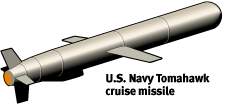
``I gave Saddam a chance, not a license,'' he said.
He added Iraq had been warned that military action would come ``without delay, diplomacy or warning.''
Further, he said that because of Iraq's intransigence, the weapons inspectors ``are saying that even if they could stay in Iraq, their work would be a sham.''
visitors since 12. september 1998
Copyright 19©98 Ken-Arild Kristiansen